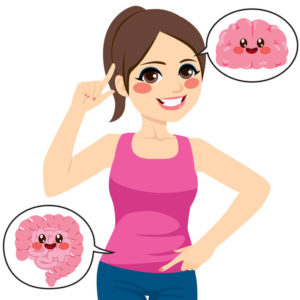Most people don’t draw any kind of connection between their mind and their stomach, apart from listening to their body’s cues regarding hunger and fullness. In truth, the brain and the gut have a much stronger relationship than many realize. If you’ve ever felt the sensation of “butterflies in your stomach” or felt like you had a “gut feeling” about something, you’ve experienced the gut-brain connection firsthand.

The system of communication between the gut and the brain is referred to as the gut-brain axis. This connection suggests that the health of the brain may directly affect the health of the gut, and vice versa. The axis is made up of both biochemical and physical connections within the body, mostly related to the nervous system.
The Gut-Brain Axis and the Nervous System
The average person’s gut contains around 500 million neurons, which are directly connected to the brain by the nervous system. Several animal studies have shown a connection between stress and gastrointestinal issues, and human studies have also shown that those who suffer from conditions affecting the gut, such as Crohn’s disease or IBS, have reduced vagus nerve function.
Studies on mice have shown that the intake of probiotics for gut health can also reduce the amount of stress hormones being distributed by the brain. This points to a close relationship between the health of the gut flora and mental wellbeing.
The Role of Neurotransmitters
Neurotransmitters are the messages created by the brain that cause us to feel emotions, and studies have found neurotransmitters to be created by gut cells as well as brain cells. In fact, a significant amount of serotonin tends to be produced by the gut and its microbes.
Gut health is directly related to mental health. Therefore, it’s important to keep both your brain and gut health with a balanced diet, exercise, and probiotics.
